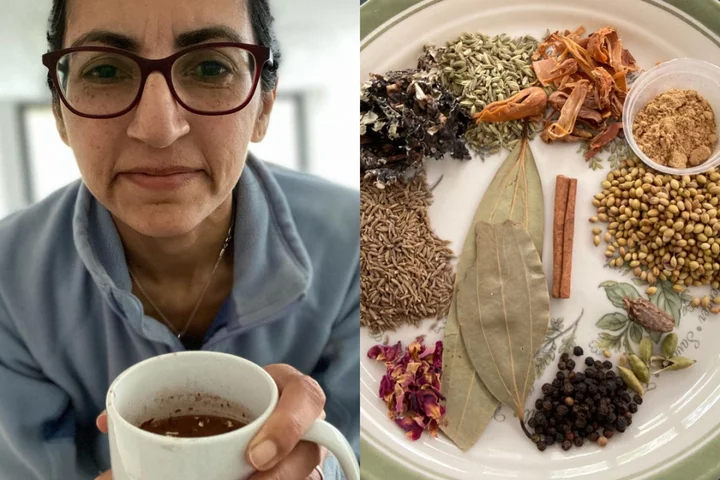
46 Books that Changed the World
Here, in no particular order, are just a few of history’s most influential tomes—and how they made humanity look at things in a new light.
2023-06-07 00:25

DJ Michael Bibi diagnosed with rare brain and spinal cancer
DJ Michael Bibi has revealed that he has been diagnosed with a rare form of brain and spinal cancer that is “moving fast”. The 32-year-old producer opened up about the diagnosis in a new Instagram post, more than two weeks since he last posted about discovering he had a “neurological problem” after a check-up for his tinnitus. Bibi, one of the most popular DJs in the UK’s dance music scene, told fans he has been diagnosed with primary central nervous system (CNS) lymphoma. He posted a selfie showing a peace sign with a cannula in his hand on Monday night (5 June) and wrote: “Writing this post is a hard one. Last week I was diagnosed with CNS lymphoma. A very rare cancer that affects the brain and spine. “Unfortunately it’s moving fast and I have to stay in hospital starting treatment immediately. Typing this message doesn’t quite seem real and I’m sorry for the bad news. “I don’t know what lies ahead,” he continued. “I’m tired but I know I am strong and I won’t let this beat me. I will be back stronger for you all. Love Bibi.” Bibi was set to play at Manchester’s Parklife festival and Glastonbury this summer. It is unclear if he will be able to perform. Fellow DJs and others in the music industry sent him well wishes, including Steve Aoki, Paris Hilton, Tiesto and the electronic duo, Disclosure. Hilton wrote: “Sending you lots of love and light. Love you.” Aoki added: “Positive energy and healing to you legend. You’ll get through this.” His record label Solid Grooves also posted on Instagram in support of the founder, including a series of photographs of Bibi performing various DJ sets. It said: “The entire Solid Grooves team sends our love and support while he recovers, and we hope to have him back with us as soon as possible to make more memories.” According to Cancer Research UK, only two in every 100 brain or spinal cord tumours are lymphomas. Symptoms can include headaches, blurred vision, personality changes, seizures, and difficulty walking and balancing. Lymphoma means the cancer began in the lymphatic system, which is a system of thin tubes and lymph nodes that run throughout the body. Most lymphomas of the brain start in the front section of the brain but can also start in the spinal cord, eyes and layers of tissue that surround the organ. Read More Fitness fanatic, 26, diagnosed with stage 4 cancer after feeling dizzy Husband of non-smoker, 24, who died two weeks after lung cancer diagnosis reveals single telltale sign Sarah Beeny: Why I’m no longer scared of cancer My child is vaping – how bad is it? ‘Covid killed my taste buds – then my business’ Gemma Collins blasted for promoting headset as ‘magic’ cure for depression
2023-06-07 00:15

My child is vaping – how bad is it?
Paediatricians have warned vaping is “fast becoming an epidemic among children” and are calling for disposable vapes to be banned. Many parents may be concerned about their own child’s health if they’re vaping. In May, Action on Smoking and Health (ASH ) warned there had been a 50% rise in the proportion of children vaping – from 7.7% of 11 to 17-year-olds trying e-cigarettes last year to 11.6% this year. And because vapes haven’t been around long (they’ve only been on sale in the UK since 2007) there haven’t been any long-term studies on the effect on health, and particularly on young lungs, hearts and brains. However, responding to a current Government consultation on e-cigarettes, the Royal College of Paediatrics and Child Health (RCPCH) has warned e-cigarettes “are not a risk-free product and can be just as addictive, if not more so than traditional cigarettes”. The RCPCH’s vice president for policy and paediatric respiratory consultant, Dr Mike McKean, says: “Without a doubt, disposable e-cigarettes should be banned. Youth vaping is fast becoming an epidemic among children, and I fear that if action is not taken, we will find ourselves sleepwalking into a crisis.” But it’s a crisis many parents are ill-informed about – so here’s what the experts think parents should know… What are vapes?Hazel Cheeseman, deputy chief executive at ASH, describes vapes – also known as electronic cigarettes – as “a battery-powered heating element which heats a liquid – generally containing nicotine and other ingredients – that’s then inhaled as a vapour by users”. Some vapes are single -use and come in bright packaging, with exotic flavours and enticing, sweetie-type names like strawberry ice cream, cotton candy and cherry cola, others are rechargeable. Can children buy vapes? It’s illegal to sell vapes to under 18s in the UK. However, youngsters are clearly still getting their hands on them. McKean, who practises in the north-east of England, says he’s concerned to hear there’s been an increase in unregulated e-cigarettes hitting the UK market recently. He points out that in the north-east alone, more than 1.4 tonnes of illegal e-cigarettes – which Trading Standards said were often indistinguishable from regulated products – were seized from shops in the second half of last year. “It’s impossible to know what these products contain or how they might impact young people’s health,” he says. “The thought that these products are ending up in the hands of children is terrifying.” What do they contain? The crucial thing for parents to know is that they contain nicotine, which is harmful and addictive. Gurch Randhawa, professor of diversity in public health and director of the Institute for Health Research at the University of Bedfordshire, says: “E-cigarettes do not burn tobacco and do not produce tar or carbon monoxide, the most harmful aspects of smoking cigarettes. E-cigarettes typically contain nicotine, propylene glycol, vegetable glycerine, and flavourings.” Are they addictive? Yes. McKean warns: “Vaping is far from risk-free, and in many cases can be very addictive.” Cheeseman adds: “It appears likely that people who have not smoked can become addicted to nicotine through vaping”. What are the health impacts long-term? Randhawa says that because vapes are a relatively new product, evidence on their health impacts isn’t clear. Experts are concerned though – especially because people under the age of 18 are still developing. Nicotine is known to cause an increase in blood pressure, heart rate, flow of blood to the heart and a narrowing of the arteries.Cheeseman says: “We don’t know what the health implications will be long-term. It seems likely there will be some, but until we have a population of people who have exclusively vaped without smoking for many decades it will be difficult to fully assess the impact.” Decades ago, no one knew about the devastating health impacts of smoking either. How can parents help children quit? Ensure your child has all the correct information and risks associated with vaping. Rather than setting strict punishments, try to be understanding and have a gentle discussion about peer pressure and having the confidence to say no. Cheeseman says nicotine replacement therapy can be used for children as young as 12. Randhawa points out that e-cigarettes should only be used to help people stop smoking. “If you haven’t smoked, you should not use e-cigarettes, as they contain nicotine, which is addictive. This message needs to be understood and articulated across society and schools to support children to not take up vaping.” Read More Charity boss speaks out over ‘traumatic’ encounter with royal aide Ukraine war’s heaviest fight rages in east - follow live Leah Williamson’s first fiction book inspired by women’s football ban protest Love Island 2023: Is having a ‘type’ holding back your dating life? 8 home repair jobs to tackle quickly – before they cost you a fortune
2023-06-06 23:56

Solar panel breakthrough paves way for ‘utility-scale’ space farms
Scientists have discovered how to double the efficiency of an ultra-lightweight solar cell, which they claim could be used to harvest the Sun’s energy in space at a never-before-seen scale. The next-generation solar panels, built by a team from the University of Pennsylvania, use layers that are over a thousand times thinner than a human hair, yet capable of absorbing a comparable amount of sunlight to commercially available solar cells. The extreme thinness earned them the label two-dimensional, or 2D TMDC, as they are only a few atoms thick. The ability to produce more electricity per weight compared to traditional silicon solar cells makes them highly suitable for sending into space to harvest the Sun’s energy, according to the researchers. “High specific power is actually one of the greatest goals of any space-based light harvesting or energy harvesting technology,” said Deep Jariwala from the University of Pennsylvania. “This is not just important for satellites or space stations, but also if you want real utility-scale solar power in space. The number of [silicon] solar cells you would have to ship up is so large that no space vehicles currently can take those kinds of materials up there in an economically viable way.” By modelling the innovative solar cell computationally, Professor Jariwala and his team were able to come up with a design that has double the efficiency compared to what had previously been demonstrated. A paper detailing the research, titled ‘How good can 2D excitonic solar cells be?’, was published in the scientific journal Device on Tuesday. The researchers now hope to figure out how to achieve large-scale production for the design. “I think people are slowly coming to the realisation that 2D TMDCs are excellent photovoltaic materials, though not for terrestrial applications, but for applications that are mobile, more flexible, like space-based applications,” said Professor Jariwala. “The weight of 2D TMDC solar cells is 100 times less than silicon or gallium arsenide solar cells, so suddenly these cells become a very appealing technology.” The concept of space-based solar arrays was first theorised more than 50 years ago, with scientists noting that the Sun’s energy could be converted into microwaves and beamed down to ground-based receiving stations that convert them into electricity. It has several advantages over terrestrial setups, as they would not be limited by cloud cover or the Sun’s typical cycle. Research has accelerated in recent years following several major breakthroughs and developments with solar energy harvesting and orbital rocket launches, including the emergence of private space companies like SpaceX that have significantly reduced the cost of delivering payloads into space. Last month, Japanese space agency JAXA announced that it was aiming to set up the first satellite transmitters for a commercial-scale solar farm in space by 2025. The European Space Agency is also planning to establish a development program for this untapped renewable energy resource through its Solaris programme. Read More Japan aims to beam solar power from space by 2025 Electric car drives for 100 hours non-stop on futuristic road Scientists smash world record for solar power window material Apple don’t want you to buy a headset - they’re selling a vision of the future Apple lets people get brand new iPhone update early – but there’s a very big warning
2023-06-06 23:50

Zara Owner Inditex Considers Fund to Back Environmental Startups
Inditex SA, which owns the Zara clothing chain, is considering setting up a vehicle to invest in startups
2023-06-06 23:29

‘Covid killed my taste buds – then my business’
A cooking teacher who lost her sense of taste and smell and “never fully recovered” after catching Covid last summer has decided to shut her business because she can no longer gauge the quantity needed or quality of ingredients in her dishes. Raisa Ali, 51, said to continue teaching people how to cook Indian food would be like “the blind leading the blind” as her sense of taste and smell have never been the same since she caught Covid in July 2022. The mother-of-three, who lives in Kingston, south London, knew “something was missing” after her husband Akbar, 52, and her students found she was being heavy-handed with the spices but could not tell the difference. Raisa made the difficult decision to close her Sweet Sultry Spice cooking school after teaching a class how to make the Indian spice mix garam masala and realising that, while she knew the recipe from memory, she could not smell the pungent ingredients. Covid has “killed the joy of cooking” and dried up her source of income, but Raisa has now accepted what happened and is looking for a fresh start. Raisa, who has three sons, twins Zain and Zakir, 16, and Yusuf, 19, said: “I can’t dwell on this anymore and just have to move forward. “My main mode of cooking and learning and teaching has been to follow my nose. “I used to make my students take whiffs of everything at every stage. “I decided to close the school because when I lost my sense of taste and smell, my passion died. “Covid killed the most important part of food for me.” Raisa started giving cooking classes in her kitchen after completing a nutrition course in 2018 and taking advice from a friend. “I did a one-year nutrition course and started working online, trying to build a small business, but it wasn’t going anywhere and I was feeling very isolated,” she said. “A friend of mine came over and said ‘you’re doing it all wrong, why don’t you just open a cooking school’. “I was scared but she was like ‘feel the fear and just do it anyway.” She soon found herself giving two or three classes per week to groups of around five people for between £60 and £70, teaching them to cook Indian cuisine. “People would come over to my house and they wouldn’t leave – it was great,” said Raisa who moved to the UK in 2008 after her husband was transferred to the country for work. “It was a really great experience and then when it went away, I just thought now what am I going to do?” Just when her budding business started taking off, bringing in between £500 and £800 per month, Covid struck. “Suddenly Covid’s happening and from one day to the next the business totally died,” she said. “The income that I had was gone and everything that I had built was gone. “I spent that first year (2020) feeling sorry for myself.” Then while travelling back to her native California, in July 2022, Raisa caught Covid and spent two weeks in bed. “I spent the first two weeks in bed and then started to recover slowly,” she said. “When I came back, I had brain fog, I couldn’t smell things properly and I couldn’t taste things properly.” She noticed her taste buds were not firing on all cylinders after eating some tortilla chips which tasted like “cardboard”. “I’m eating them and thinking, I don’t understand, what is this?” she said. “And it has just never come back properly.” While Raisa started to recover after spending two weeks in bed, some of her symptoms lingered for months. Once lockdown rules lifted, Raisa went back to giving cooking classes, but it was not the same. In January 2023, while teaching a group how to make garam masala from scratch, Raisa’s sense of smell was put to the test. “When they could smell it across the room then I knew, at that point, that this wasn’t going to work for me because it would be like the blind leading the blind,” she said. “I remember telling my customers, look I’m telling you everything from memory and my past experience because I don’t have have my sense of taste and smell. “Isn’t that depressing?” On another occasion, she was cooking a chicken dish and a student asked about the ingredients but Raisa could not “taste anything”. “It turned out it was black pepper but I couldn’t even taste it,” she said. Her husband and children also started picking up on strong flavours which appeared relatively mild to her. “I knew something was missing because when I cooked things for my husband he would say ‘oh, you put a lot of this in’,” Raisa said. “But I could not tell the difference.” Even to this day, Raisa says she has not fully recovered her sense of taste and smell. “If I would sum it up, Covid killed the joy,” she said. “I just feel like I don’t want to bother anymore because I feel like my drive is gone. “So I decided, either I can be upset about it or I can reinvent myself again.” Raisa has decided to see her Covid nightmare as a positive step towards new beginnings. “If you are cooking something, you have to be able to smell and taste the ingredients and I knew I couldn’t do that so I decided it was time for a complete shift,” she said. She has not been to see a doctor about her long-lasting symptoms as she believes there are many other people who are “far worse off” and that the NHS already has “too much on its plate”. She is now looking to explore other business opportunities which do not rely on having a sense of taste and smell. “Sustainable living” is one area in which Raisa is particularly interested, but what this will look like in practice remains to be seen. “I want to get rid of my carbon footprint,” she said. “I don’t need to prove anything to anyone, it’s just what I want to do.” For more information about next steps, follow Raisa on Instagram. Read More Covid Inquiry could see unredacted Johnson WhatsApp messages despite legal clash I decide what’s relevant, says Covid inquiry chair in Boris WhatsApp row Covid Inquiry head making ‘no comment’ on legal row over Johnson messages Charity boss speaks out over ‘traumatic’ encounter with royal aide Ukraine war’s heaviest fight rages in east - follow live
2023-06-06 21:17

Astrud Gilberto: The Girl from Ipanema singer dies at 83
She was only in the studio as a translator, but ended up singing on the hit song and becoming a star.
2023-06-06 20:57

Gemma Collins blasted for promoting headset as ‘magic’ cure for depression
Gemma Collins has been criticised by her followers for using misleading wording in an advert for a “medication free” headset, which is apparently used to treat depression. The TV star and presenter, 42, who is best known for appearing in realty series The Only Way Is Essex, shared a video of her wearing the Flow Neuroscience Headset, telling her followers that she had been using the product for one week and was already feeling “lighter” and “brighter”. In the caption she wrote: “According to Flow’s data it reduces depression in 88 per cent of people. And the NHS are trialling it too.” She finished the caption with “#ad” to indicate that she was asked to promote the product. The Independent has contacted Collins’ representatives about the terms of the advert. In the video, Collins told the camera the product is “literally amazing”. “I am loving life now off of my depression tablets. This has been a real game changer for me,” she said. According to Flow, the headset sends a “small electrical current” to “the left dorsolateral prefrontal cortex”, which causes “neurons to fire more frequently, strengthening the neural pathways in the prefrontal cortex”. Collins continued: “Flow is a new medically approved depression treatment. It focuses on the front cortex of your brain. This ultimately helps you to relax and it also helps to remove negative depressive symptoms.” “For people that can’t get access to therapy, or don’t want to be on antidepressants, they have a new option which is Flow.” “Flow actually works faster and better than antidepressants,” she claimed in the video. “It’s like having your own therapist in the comfort your own home and you’re fully in control of your own treatment.” She concluded that using Flow would be “the best thing you do”. Social media users have been criticising Collins’ messaging in the post, arguing that she is promoting the product as a “quick fix” for depression and encouraging people to stop their medications without first consulting a medical professional. “People PLEASE speak to your medical team before stopping any medications,” one person urged in the comments section. Another pleaded to Collins: “Please don’t promote people just abruptly coming off their medication !!” Others remarked that Collins had not linked to any scientific research to support her claims, or given insight into how the product actually works. A representative for Flow Neuroscience told The Independent that it is “very clear” on its website that anyone with depression should “always speak to their doctor first before trying new treatment”. The statement continued: “At a time when society is attempting to remove the stigma associated with mental health – people like Gemma are helping enormously by being open and transparent about their own mental health journey.” “Gemma has struggled for years on antidepressants, and it’s brilliant that she is now having this positive experience using Flow.” The spokesperson added that Collins’ posts are a “reflection of her own personal experience” and the post had not been “edited or scripted” by Flow. Collins has previously said that the side effects of using antidepressants have not worked for her, which drew her to using the headset. Flow’s spokesperson also said that the company’s mission is trying to “increase accessibility” to mental health treatments. At present, the headset does not require a prescription before use and is available to purchase online. The company says that “83 per cent of its users reported improvement in their symptoms within 21 days” and that less than two per cent of its users on its database reported minor side effects, which are “typically mild irritation of the kind and mild headaches”. It added: “We believe the Flow platform is an important tool in this process, but it has never been our intent to present Flow as a quick fix or magic bullet.” Read More Prince Harry court – live: Duke of Sussex stokes political storm by slamming ‘rock bottom’ government Ioan Gruffudd’s 13-year-old daughter ‘files restraining order against him’ Busy Philipps calls out Leonardo DiCaprio for ‘dating’ model who looks like her teen daughter Gemma Collins says she wouldn’t ‘need to’ consider surrogacy Fitness fanatic, 26, diagnosed with stage 4 cancer after feeling dizzy The telltale sign of lung cancer everyone should know
2023-06-06 19:50

Palau country profile
Provides an overview of Palau , including key events and facts about this tropical island nation in the northern Pacific.
2023-06-06 19:29

Melissa Barrera aims to explore her dark side in next Scream film
Melissa Barrera is eager to explore the dark side of her character Sam Carpenter in the next 'Scream' movie.
2023-06-06 19:27

Sam Hargrave ecstatic with Idris Elba casting in Extraction 2
Sam Hargrave was thrilled that Idris Elba agreed to board the cast of the 'Extraction' sequel.
2023-06-06 19:24

Eric Clapton announces 2024 tour, including 2 nights at Royal Albert Hall
Eric Clapton has announced a six-date tour for 2024.
2023-06-06 19:22
